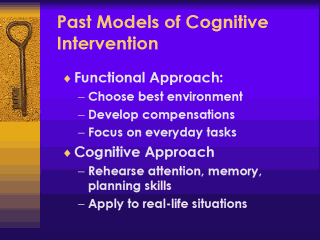 |
So I want to acknowledge my background and maybe what some of
the rest of you come from. When somebody says to me, Iím getting older and I already
have some changes is thinking and I want to fix my brain, fix my memory; that sounds very
meaningful to me because Iíve heard this for years when I meet with people who have had
a head injury or a stroke or someone who has had a prior brain injury. And so I have this
long history myself where I am basically educating people maybe incorrectly, that we can
teach people compensatory strategies but we donít actually know how to fix the brain. I
think maybe Iím wrong because of course in recent years some of the work on cerebral
reorganization really is a fascinating open door to the fact that maybe we were actually
changing peopleís brains a little bit but we didnít know it at the time. In any case,
I would like to mention that traditionally that in terms of general rehab principals, we
have a functional approach and a cognitive approach to people with brain injury. In a
functional approach we ask people to choose the best environment for their current level
of function. We help them develop compensatory strategies so they can make the best use of
what theyíve got and get around obstacles that they think they canít do anymore
because of cognitive limitations. We ask them to focus on doing everyday tasks. What do
you need to do to get through the day, to get through your job, to take care of your kids?
On the other side we have the cognitive approach which focuses more on rehearsing through
computer use, through workbooks, and through one-on-one practice specific cognitive
domains. Attention, memory, planning skills, executive function skills and then ask that
individuals to apply those to real life skills down the road. |
